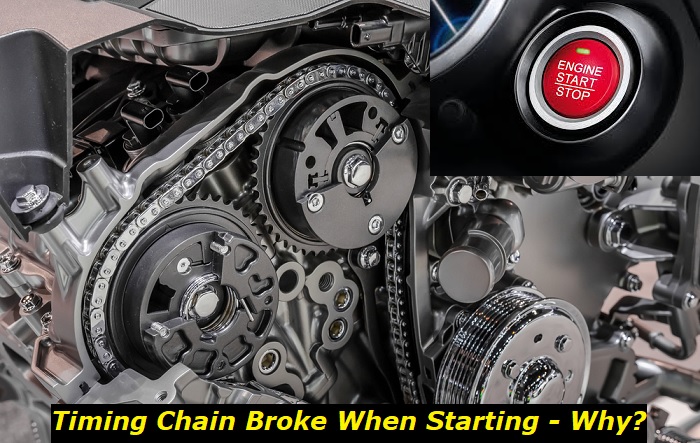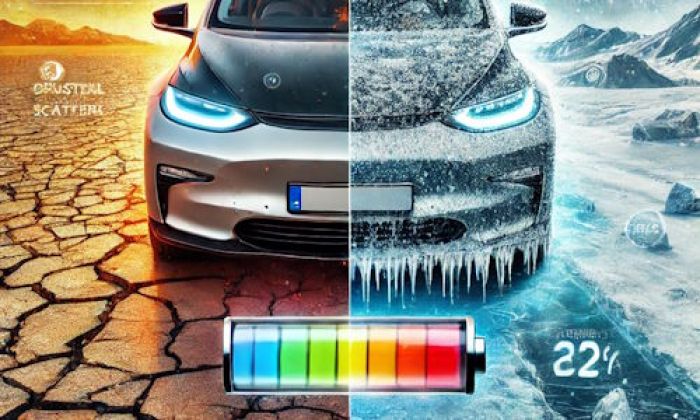If your timing chain breaks while starting the engine, you should immediately stop trying to start it. The engine is inoperable and requires professional repairs now. This could happen because of the timing chain wear, sudden problems with the tensioner, or the issues with shafts in your engine.
Hard engine starting highlights
- Level of urgency:Medium
- Can you drive?Yes, if it starts
- DIY inspection:Possible but complicated
- DIY repair:Mostly,impossible
- Price for repair:$200 - $750
- Common Reasons:Spark issues, carb problems, compression, engine problems
- Ways to fix:Inspect spark plugs, check compression, verify fuel supply is good

The timing chain broke when starting - why?
So, the timing chain connects the camshafts and the crankshaft of your engine. It makes sure that the cams open the valves exactly at the needed moment and that the crank is pushing up the exact piston when required. If the timing changes, the engine will not work.
So, now you know that the work of your timing chain is connected with the camshafts and crankshaft rotation. Also, the chain has the tensioner and, very often, it drives the water pump. Both the tensioner and the pump may cause some problems.
Now, why can the chain brake exactly when starting? There are several reasons:
- The engine was inactive for some time. In this case, something in the timing system may have got corroded or stuck and the chain got the tension it couldn't bear.
- Something in the timing system was worn out. Any mechanism in bad condition may cause chain breaking.
- Poor lubrication when cranking. When you only start the engine, your camshafts may still be pretty dry because the oil needs some time to get to them.
So, this explains why the chain may brake at startup. If this happens, you will most likely hear the loud metal noise from under the hood and then the engine will not start however long you crank it.
The reason why it doesn't start is simple - now you are cranking the crankshaft and the pistons go up and down but the valves stand still because there is nothing that makes them move. Starting such an engine is completely impossible.
What are the actual reasons for chain braking?
When your chain is broken during engine start, the reasons are almost always the same as if it was broken in any other case. It's important to know why this may happen so that you prevent this from occurring in your vehicle.
Here are the most obvious reasons:
1) The chain is worn out and old
Even though car manufacturers tell us that modern chains are made to last forever, it's not completely true. It doesn't mean that you can forget about this part. If you hear the engine rattling, it means that possibly the chain is stretched and requires urgent replacement.
Also, old thin chains may break even without stretching. They may lose one of the units that connect links and eventually fall apart when you start the engine or drive the car.
2) The tensioner is the culprit
One more pretty common situation is when the tensioner stops working. It may release the tension of the chain immediately or step by step and lead to the broken chain. The tensioner is made to work certain miles or years but then it will deteriorate quickly and fail to do its job correctly.
3) Poor lubrication
The chain and the tensioner both rely on lubrication. If you use the wrong or just poor-quality oil, it's not a surprise that you found your timing chain broken, in the end. Oil is the engine's blood, so you should make sure that you use the recommended type of oil.
Too thick or contaminated oil will not lubricate the tensioner and may even cause its premature death. Also, such oil will cause overheating of the chain and other issues that don't prolong the life of the unit.
4) Camshaft or crankshaft problems
Camshafts and crankshafts in your engine rotate when the engine works. They rotate at quite a high speed. They rely on bearings that can easily go bad if the engine is poorly lubricated. Once this happens, one of the cams or the crankshaft may get stuck. This may lead to high tension of the chain and it may eventually break it.
What should you do when the chain in the engine is broken?
So, you've been trying to start the car but suddenly you heard a clunking noise and then the engine just cranks but doesn't start. There is a high chance that it's because of the broken timing chain.
Now, here are the things you should immediately do:
- stop trying to start the engine - this will destroy it;
- have the car towed to the nearest dealership or good repair shop;
- let specialists take care of the vehicle;
- alternatively, you can replace the timing chain on your own if you have the expertise for this.
There is no other repair for this problem but replacing the chain. When you do this, you should also replace the tensioner and the water pump. It's important to inspect the valves and pistons for any possible problems and defects.
The problem is that when the chain is broken, the engine block and the head rotate on their own and there is a big chance that the pistons hit the valves. Given the valves are pretty tender and thin, they may easily bend. If this happens, you will not be able to start the engine after simply replacing the chain. What's more, the new chain may also break if you don't control this.
How long will the timing chain live in your car?
The lifespan of the chain depends on many factors such as its thickness, the type of engine, the units it drives, the maintenance quality, etc. On average, a good timing chain will last up to 150,000 miles. But there are all these small engines with thin and tender chains that can barely last 100K miles.
Whenever you hear rattling from your engine, you should know that this is a clear sign of the problem.
Also, you should pay attention to other important features:
- the timing may change a little when the chain is stretched, so the engine will work harshly;
- you may feel power loss at the final stage of chain deterioration;
- any chain that has been through more than 150K miles, should be inspected carefully;
- also, chains that are over 10 years old are important to take care of;
- you should be careful with chains if the engine hasn't been used for more than a year.
These are all the factors that should make you pay attention to the chain. If you don't do that, you may regret it. Sometimes, the failed timing chain is the reason for engine replacement. If things don't go the best way after the chain is broken, you may have bent valves, broken pistons, a stuck engine, and even issues with the rod bearings.
Will chain replacement solve your problems?
If the chain is broken, you will have to replace it to use the engine. But before you order the chain kit, have the engine inspected. Sometimes, the damage is so serious that repairing the engine is not worth the money.
I've told you before that the problems may be with the valves, pistons, etc. Also, the entire head may be broken. I've seen a situation when the bent valve caused cracks in the head. It's very important to inspect everything carefully before you agree to invest money in the engine repair.
If the chain is the only broken part, you may buy the new one, install it, and try starting the engine. If the valves aren't broken, the engine will start. But if not, it requires more serious repair.
Also, pay attention to the timing chain installation. I've witnessed dozens of situations when car owners decided to do the job on their own but forgot about timing chain marks and this killed their engines entirely. It's always better to find a professional mechanic who will do this job for you.
Final thoughts
It's important to take care of the timing system of the engine in your car. The fact that the engine has the chain, not the belt, doesn't change the idea of maintenance. You will still need to check if it's OK and replace it when the chain is not OK.
If you hear the engine rattling, one of the first things to check is the timing chain. If you don't replace it on time, the chain may break and bring a lot of expensive problems with this.
If you still have any questions or want to share your experience, write in the comments below!
About the authors
The CarAraC research team is composed of seasoned auto mechanics and automotive industry professionals, including individuals with advanced degrees and certifications in their field. Our team members boast prestigious credentials, reflecting their extensive knowledge and skills. These qualifications include: IMI: Institute of the Motor Industry, ASE-Certified Master Automobile Technicians; Coventry University, Graduate of MA in Automotive Journalism; Politecnico di Torino, Italy, MS Automotive Engineering; Ss. Cyril and Methodius University in Skopje, Mechanical University in Skopje; TOC Automotive College; DHA Suffa University, Department of Mechanical Engineering






Add comment